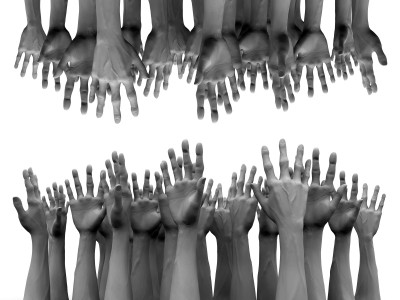The seemingly shady characters who inhabit the Israeli Secret Service lay accused of stealing the identities of six British citizens as part of a plot to murder a Palestinian militant. If true, that’s not very nice behaviour is it? Tiger Woods is about to break his silence over his serial infidelity; whatever you think about his golfing prowess, he has hardly been a model husband has he? Meanwhile an 11-year-old boy has just ranked up his 50th criminal offence. Would you like him as a neighbour?

Wherever you look there are examples of negative and nasty behaviour. It might make you think that the human race is going down the pan. We’re all doomed. Headlines are full of murder, thuggery and cheating, not to mention the overt selfishness of those mean and measly bankers. It’s a harsh, cruel world out there isn’t it?
Well, actually, no it is not. People are naturally more likely to be positive, supportive and helpful of other people. The media coverage we get is there because it is so rare to see this kind of behaviour. Most 11-year-olds aren’t criminals; most golfers are faithful to their wives and most bankers are nice, decent people – many making significant donations to charity.
If you want proof that people are actually nice to each other, that they like helping one another and that they are decent, honest and truthful, go to Twitter. Just spend 10 minutes – you don’t need any more – observing the “Twitter stream” and see what passes by. What you will witness is a large number of people helping each other. Questions will get answered. information will be shared, useful links will be posted and all manner of helpful, supportive and positive suggestions will appear before your eyes.
Twitter is an exhibition of altruistic behaviour and demonstrates that there are people “out there” willing to help you and your business. Indeed, only this week Twitter provided me with some real, practical help. I was asked by two media students to take part in their final year project. They needed to interview me on video in a quiet, office setting. The trouble was, I was travelling on the day of the interview and needed an office for around an hour, away from my base. I could, of course, have booked an hour or two with an office rental company. But that would have been £50 or more; I was already giving up my time to help these students (altruism) but should I also fork out my hard-earned cash for them?
So I posed a question on Twitter. I merely asked if anyone had a spare office they could lend me for an hour or two. Within moments I had a couple of helpful suggestions and then a few minutes later a direct offer from Dean Faulkner of Isogon Marketing, the telemarketing specialists. He offered me use of his meeting room without requesting anything in return from me. That is true altruism – thank you to him.
It also points out another important fact for many online business owners. Many struggle to get things to work – even understanding Twitter itself. They sit there, frustrated, annoyed – even angry, because something they are trying to do with their website, their shopping cart or their social network profile just will not work as they want. Late nights, loads of coffee – and hours wasted. Yet, if they only asked, there are good, kind and generous people “out there” who would be only too willing to help – simply because they want to, with nothing desired in return.
The fact is, your business could be improved if you asked for help. Similarly, your business could also be improved if you provide help. Indeed, altruistic behaviour makes us feel good about ourselves. When we help other people our “happy hormones” rise in our body. And when they are abundant it improves our overall health. That’s one of the reasons why altruism is present in human beings – it makes for a healthier life.
So, don’t get downhearted by all those negative headlines; instead ask for help on Twitter and you will get it. Provide help on Twitter and you will feel good about life as well. It just makes you think – perhaps the Israeli Secret Service didn’t need to “steal” any identities at all – there would have been people willing to help them, if only they had asked.
